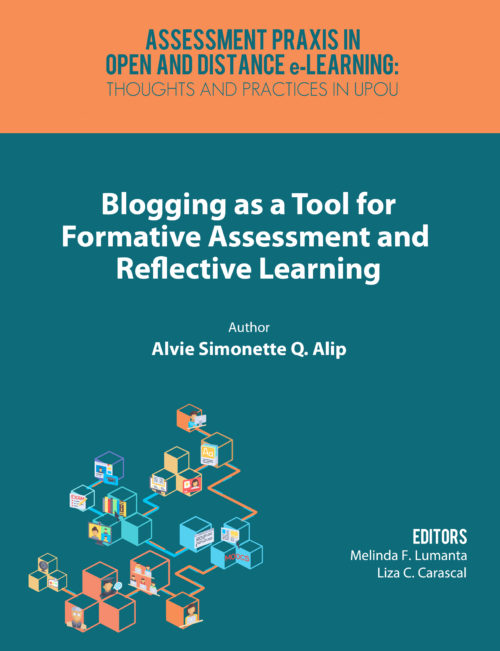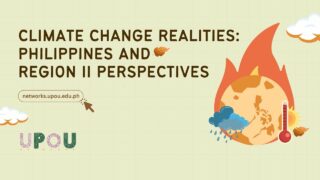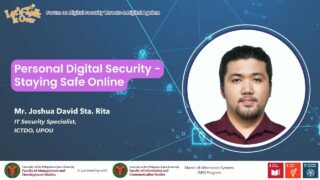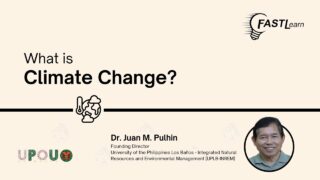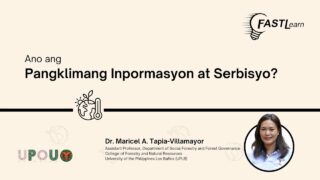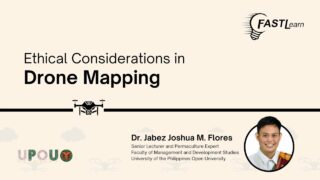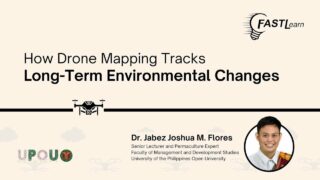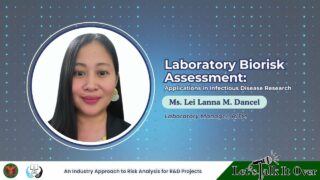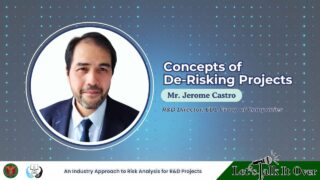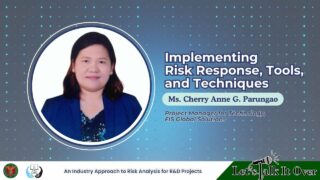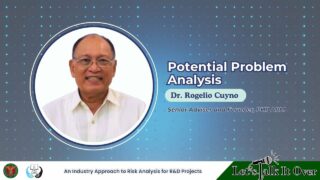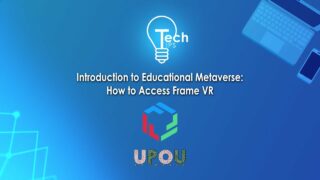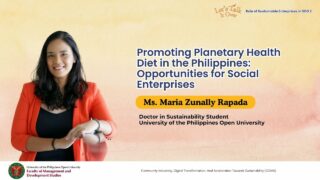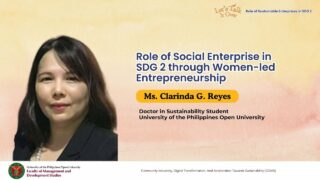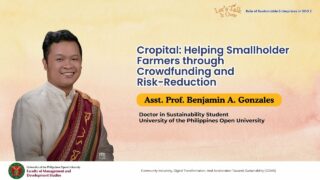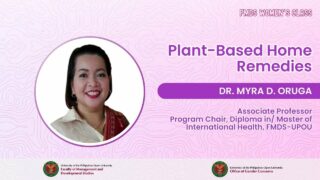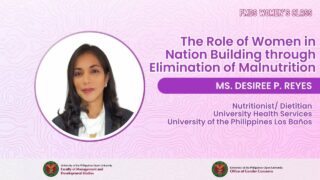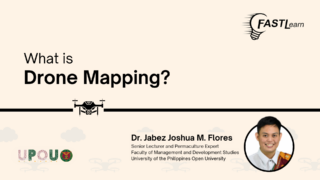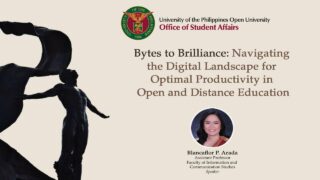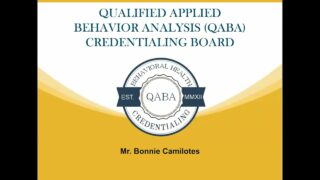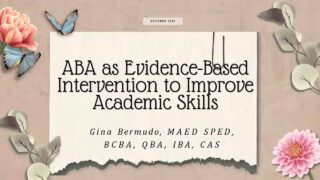The students’ ability to integrate concepts, perform specific skills, and reflect on their own learning are often more successfully measured using non-traditional or alternative assessments such as learning journals. “A learning journal is usually a vehicle for reflection” (Moon, 2003), and teachers can use journal writing to meet specific goals like polishing skills (Hopkins, 2010). The blog or Web log is a type of Web page that is simple to create and disseminate, and is used as a form of online journal (Mason & Rennie, 2010). Through an online interview of the faculty-in-charge (FIC), this paper describes the use of blogging in evaluating the Advance Ecology (BIO 260) students’ understanding of important ecological concepts, review on what they have learned, and develop their writing and analytical skills. Results show that blogging can be used as an alternative tool for formative assessment and reflective learning, but generally entails additional time factor for the students and the FIC.
The Ohio Department of Education (ODE) defines assessment as a process of collecting evidence on what students know and can do. Assessments may be classified as pre-assessment (before the education process), formative (during the education process), or summative (after the education process). They provide information and bases for revising lessons according to student performance.
The focus of this chapter will be on formative assessment. According to McManus (2006), “formative assessment is a process used by teachers and students during instruction that provides explicit feedback to adjust ongoing teaching and learning to improve students’ achievement of intended instructional outcomes.” An assessment performed over the course of a lesson determines student progress and allows the teachers to adjust their instruction and the students to reflect on their learning (Ohio Department of Education).
Reflective learning is the process of internally examining and exploring an issue of concern. Experiences can prompt reflections on an issue, and can create and clarify meaning in terms of self, resulting in a changed conceptual perspective (Boyd & Fales, 1983). Critical thinking, self-awareness, and analytical skills are also developed in reflective learning. Furthermore, it helps students “to understand better how theory can be applied in practice or where practice is consistent with concepts and theories” (The Higher Education Academy).
Reflection is important in higher education as explained by many theories, the two leading theorists of whom are Schon (1983) and Kolb (1984). The reflective practice is defined by Schon in two capabilities: reflection in action while doing something, and reflection on action after an action has been done. Kolb, on the other hand, developed the theory of experiential learning and produced the cyclical model for reflective practice where individuals learn from experience. The model is known as the Kolb Cycle, the Learning Cycle, or the Experiential Learning Cycle, and is comprised of four stages as shown in Figure 1. To experience successful learning, “the learner must make the link between the theory and action by planning, acting out, reflecting, and relating it back to the theory” (Davies, n.d.).
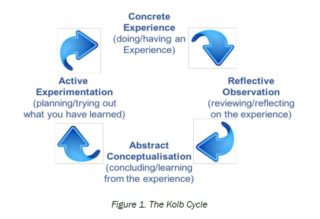
Reflective learning can be assessed in various forms that provide structure wherein thoughts and recollections are recorded and can be reviewed. These forms include a reflective portfolio, essay, diary, log, or journal.
The journal was identified by Ibe (1997) as one of the non-traditional assessment tools. According to Hopkins (2010),
“Teachers can use journal writing to meet specific goals, or the purpose can be wide open. Some teachers check journal writing and work on polishing skills; others use journals as the one ‘uncorrected’ form of writing that students produce. Some teachers provide prompts to help students begin their writing. Others leave decisions about the direction and flow of student journals up to the students.” (Hopkins, 2010; par. 1)
Learning journals are increasingly used in higher education as means of facilitating or assessing learning. A learning journal is characterized as: diverse; mostly in written format; generally reflective and accumulated over a period of time with the intention to learn; flexible as it can be structured or unstructured; a useful back-up to learning; accentuates favorable conditions for learning such as space, time, and reflection; and applicable not only to literary but also to all disciplines (Moon, 2003).
The blog or Web log is a “a type of Web page that is simple to create and to disseminate and that is used as a form of online journal” (Mason & Rennie, 2010). It is also defined as “a web page that serves as a publicly accessible personal journal for an individual”, and is typically updated daily and often reflects the personality of the author (Beal, 2017).
The goal of this chapter is to describe the use of blogging as a potential tool for formative assessment and reflective learning of Advance Ecology (BIO 260) students. Specifically, the objectives are to: (1) determine the advantages and disadvantages of using blogging; and (2) describe the Faculty-in-charge’s observations on students’ experiences with blogging.
The information and data needed were collected from existing documents and databases (e.g., Office of the University Registrar database, UP Open University website, course guide); interview of the BIO 260 FIC; and viewing of the blogs created by BIO 260 students.
The BIO 260 FIC used the blog to evaluate the students’ understanding of important ecological concepts, reflect on what they have learned, and develop their writing and analytical skills. The blog is 20% of each BIO 260 student’s final grade. Ten blog entries were required of each student, for a total of 200 points. The blog entries can be time-based, module-based, or topic-based, and were evaluated based on presentation (30%), grammar (35%), and correctness of understanding of the concepts (35%).
Below are sample blog links from Bio 260 students:
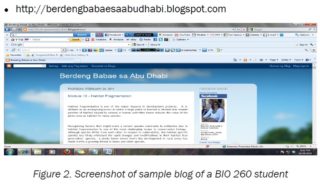
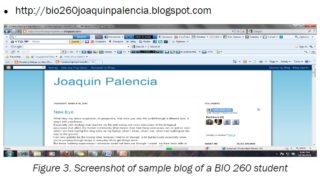
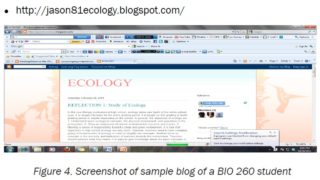
“Assessment is the engine that drives student learning” (Cowan, 2005). One important role of assessment is helping students understand how they learn for them to improve their own learning and thinking skills. The BIO 260 FIC described his students’ experiences with blogging as a formative experience below:
When students are asked to reiterate their learnings/understanding of the content, and put them into action, they will be able to see whether or not they have learned it correctly… it’s actually a visualization of their conception of the contents… visualization of their conception can help them re-check whether it is correct or not… so once seen as misconception, they can easily rectify it… (R.B., BIO 260 FIC)
The activation of prior knowledge and knowledge construction, deconstruction, and reconstruction are enabled in learners through reflective learning. In doing reflection, the students benefit through learning from experience, developing metacognitive skills, developing the skills of professional practice, exercising responsibility for their own learning and actions, building capacity to restructure or reframe knowledge, and continual improvements in practice (Curtin University, n.d.).
Several authors are in agreement in describing blogging as a means of encouraging more introspection and deep thinking among students while they engage themselves in writing on their blogs or giving comments on someone else’s blogs (Armstrong et al., 2004; Chan & Ridgway, 2003; Poling, 2005; Stiler and Philleo, 2003 as cited by Goh, Quek & Lee, 2010).
The BIO 260 FIC described his students’ reflective learning experience below:
the things that they are putting into the blog are actually reflections of the contents…and as I observed, they are even putting additional information.. over and above the things discussed in the class… Likewise, it allows the students to determine whether or not they have weak writing and analytical skills.. and as the teacher, it will help me identify the type of support that I need to provide to students… (R.B., BIO 260 FIC)
Active learning is encouraged through a well-designed assessment tool, especially when its delivery is innovative and engaging (Cowan, 2005). Online learning journals like blogging can provide assessments that illustrate student progress during an instructional unit or over a longer period of time. Through blogging, reflective learning is being practiced as students integrate and apply their thoughts to their course concepts (Palloff & Pratt, 2009). Blogging allows the students to process information in a more personal level and at the same time gain different perspectives, thus making the course content more relevant to them (Davi, et al., 2007; Kerawella, et al., 2008; Xie et al., 2008).
A student is said to have a meaningful learning experience if she or he can make sense of her or his own learning and is actively engaged in the learning process. Such experience is expressed by one student:
… it seems this is my first course where I have to read and read and read. I’m not complaining. There’s no use. I actually learned a lot. From experience, I seem to learn more on my own. (J.A., Cross-enrollee, BIO 260 student)
Table 1 shows the FIC’s observations on the advantages and disadvantages of using blogs as part of the BIO 260 course requirement. Blogging enhanced the students’ reflections on the subject matter, though it entailed additional time to blog and to read scientific articles, and may discriminate some students who still need to develop blogging skills.
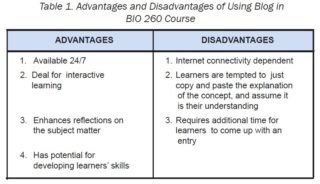
The availability of blogging is in line with the ‘anytime and anywhere’ feature of online and distance e-Learning (ODeL). Moreover, the other advantages of blogging specified above implied that a sense of community is fostered among students as they learn together in discussing, exploring, and discovering their course content (Glogoff, 2005). According to Raffo (2012):
Blogs provide a forum to hone writing and communication skills, critical thinking and research skills, and competency in technology, while promoting a student-centered and self-directed learning environment (p. 43).
On the other hand, the disadvantages of blogging have something more to do with the technical and practical issues. Internet access is one of the basic requirements for ODeL students to have, and their accessibility to a fast Internet connection is dependent on the availability of a good Internet service provider in their location. Whereas, in blogging their entries, the students need to be provided with practical tips on blogging and the ethical issues that comes with it. As posit by Xie et al. (2008), “students essentially become more skilled reflective thinkers and learning experiences are strengthened through their blogging experiences.” In short, the more students continue to blog, the more their reflective skills increase.
The study reveals that blogging is a potential tool for formative assessment and reflective learning. However, there are advantages (e.g., available 24/7, ideal for interactive learning, enhance reflection) and disadvantages (e.g., Internet dependent, tendency to copy concepts, time constraint) in using blogging as assessment tool. The FIC also observed that using blogging as an assessment tool may discriminate some students (e.g., no Internet connection, little background), but making blogging as part of the course requirement not only compelled students to develop their blogging skills and reading scientific papers, but it also engaged them to deeper learning and more meaningful learning experiences. By critically reflecting on the course content and how they can be connected with their personal experiences, blogging allows the students to attain a sense of ownership over their learning. Moreover, the results indicate that blogging also fostered a sense of community as students engaged in sharing their ideas with their classmates throughout the course delivery.
The teachers should ensure that the assessments they will be using will give their students the opportunity to be active and reflective participants in their learning. They should also use assessment tools that will help students identify and understand how they learn to enable them to improve their own learning and thinking skills.
Bagarinao, R. (2010). Advanced Ecology Course Guide, 1st Semester AY 2010-2011. UP Open University.
Boyd, E. & Fales, W. (1983). Reflective learning: Key to learning from experience. Journal of Humanistic Psychology, 23(2), 99-117.
Beal, Vangie. (2017). What is blog?. Retrieved from https://www.webopedia.com/TERM/B/blog.html
Chan, K. K., & Ridway J. (2005). Blog: A tool for reflective practice in teacher education? Retrieved from http://www.dur.ac.uk/resources/smart. centre/Publications/BlogsFloridaeista2005.pdf.
Cowan, J. (2005). Designing assessment to enhance student learning. Retrieved from, http://www.heacademy.ac.uk/assets/ps/documents/practice_guides/practice_guides/ps0069_designing_assessment_to_improve_physical_sciences_learning_march_2009.pdf
Curtin University. (n.d.). Reflective Learning. Retrieved from http://otl.curtin.edu.au/learning_teaching/philosophy_teaching/student_centred/reflective.cfm
Davi, A., Frydenberg, M., & Gulati, G. J. (2007). Blogging across the disciplines: Integrating technology to enhance liberal learning. MERLOT Journal of Online Learning and Teaching, 3(3).
Davies, C. (n.d.) Kolb learning cycle tutorial – Static version. Retrieved from, http://www.ldu.leeds.ac.uk/ldu/sddu_multimedia/kolb/static_version.php
Engage in Asessment (n.d.). Retrieved from https://www.reading.ac.uk/engageinassessment/why-is-assessment-important/eia-why-is-assessment-important.aspx
Fairbrother, R. (2000). Strategies for learning. In Monk, M. & Osborne, J. (Eds.), Good Practice in Science Teaching: What Research Has to Say. Buckingham: Open University Press.
Glogoff, S. (2005). Instructional blogging: Promoting interactivity, student-centered learning, and peer input. Innovate, 1(5).
Goh, J.W.P., Quek, C. J., & Lee, O. K. (2010). An Investigation of Students’ Perceptions of Learning Benefits of Weblogs in an East Asian Context: A Rasch Analysis. Educational Technology & Society, 13 (2), 90–101.
Hopkins, G. (2010). Journal writing every day: Teachers say it really works! Retrieved from http://www.educationworld.com/a_curr/curr144.shtml
Ibe, M. (1997). EDSC 305 seminar: Issues and trends in science and technology education. Quezon City: UP Open University.
Kerawalla, L., Mincha, S., Kirkup, G., & Conole, G. (2008). Characterizing the different blogging behaviours of students on an online distance learning course. Learning, Media and Technology, 33(1), 21-33.
Kolb D.A. (1984) Experiential learning experience as a source of learning and development. New Jersey: Prentice Hall.
Mason, R. & Rennie, F. (2010). Evolving technologies. In Rudestam, K.E. & Schoenholtz-Read, J. (Eds.), Handbook of Online Learning (2nd Ed.). Los Angeles: SAGE Publications, Inc.
McManus, S. (2206). Attributes of effective formative assessment. Retrieved from www.npcpublicschools.org/docs/accountability/educators/fastattributes 04081.pdf
Moon, J. (2003 n.d.) Learning journals and logs, Reflective Diaries. Retrieved from racma.edu.au/index.php?option=com_docman& task=doc_view&gid=216
Palloff, R. M. & Pratt, K. (2007). Building online learning communities: Effective strategies for the virtual classroom. Jossey-Bass: San Francisco.
Poling, C. (2005). Blog on: Building communication and collaboration among staff and students. Learning and Learning with Technology, 32(6), 12-15.
Raffo, D. (2012). Blogging as a reflective tool for leadership development: an exploratory study of a leadership practicum grounded in the relational leadership mode. Delta Pi Epsilon Journal, 54(2), 39-51.
Stiler, G. M., & Philleo, T. (2003). Blogging and blogspots: An alternative format for encouraging reflective practice among preservice teachers. Education, 123(4), 789-797.
Xie, Y., Fengfeng, K., & Sharma, P. (2008). The effect of peer feedback for blogging on college students’ reflective learning processes. The Internet and Higher Education, 11(1), 18-25.
Alip, A. S. Q. (2018). Blogging as a Tool for Formative Assessment and Reflective Learning. In M. F. Lumanta, & L. C. Carascal (Eds.), Assessment Praxis in Open and Distance e-Learning: Thoughts and Practices in UPOU (pp. 65-75). Los Baños, Laguna, Philippines: UP Open University
